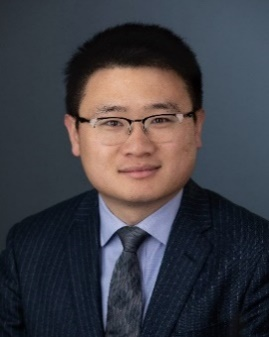报告题目:Enhancing Risk Management and Mitigation for Critical Civil Infrastructures through Advanced Monitoring, Inspection, and Control
提升重大基础设施风险管控能力--结构健康监测,检测和控制进展
报告人:李健 副教授
时 间:2023年12月21日(星期四)10:00-11:30
主持人:冯青松 教授
地 点:教40栋204会议室
报告人简介:

Dr. Jian Li is the Francis M. Thomas Chair’s Council Associate Professor and Dean R. and Florence W. Frisbie Associate Chair of Graduate Studies in the Department of Civil, Environmental and Architectural Engineering at the University of Kansas, where he also holds a courtesy appointment in the Department of Electrical Engineering and Computer Science. He received Ph.D. from University of Illinois at Urbana-Champaign, and M.S. and B.S. from Harbin Institute of Technology. His research focuses on both theoretical and experimental developments of advanced sensing and structural health monitoring techniques to improve the resiliency and sustainability of civil infrastructures under operational and extreme loading conditions. Dr. Li was awarded the Takuji Kobori Prize by IASCM - International Association for Structural Control and Monitoring, the Rising Stars in Structural Engineering from the Civil + Structural Engineer Magazine, and the Miller Professional Service Award for Distinguished Research from KU School of Engineering. He holds three US patents, has over 150 publications, and has served as PI or Co-PI on research projects worth over $10 million. Dr. Li is the current vice chair of the ASCE Structural Health Monitoring & Control Committee and the secretary of the US-China Earthquake Engineering Foundation. He also serves as an associate editor and editorial board members of several international journals such as Frontiers in Built Environment, Engineering Structures, Smart Structures and Systems, Journal of Building Structures, etc.
李健博士是堪萨斯大学土木、环境和建筑工程系弗朗西斯-托马斯主席理事会副教授兼 Dean R. and Florence W. Frisbie 研究生副主席,同时还兼任该校电子工程和计算机科学系的客座教授。他在伊利诺伊大学香槟分校获得博士学位,在哈尔滨工业大学获得硕士和学士学位。他的研究重点是先进传感和结构健康监测技术的理论和实验开发,以提高民用基础设施在运行和极端负载条件下的弹性和可持续性。李博士曾荣获国际结构控制与监测协会(IASCM)颁发的小堀拓治奖(Takuji Kobori Prize)、《土木与结构工程师》杂志(Civil + Structural Engineer Magazine)颁发的结构工程新星奖(Rising Stars in Structural Engineering)以及昆士兰大学工程学院(KU School of Engineering)颁发的米勒杰出研究专业服务奖(Miller Professional Service Award for Distinguished Research)。他拥有三项美国专利,发表了 150 多篇论文,并在价值超过 1 千万美元的研究项目中担任首席或共同首席研究员。李博士现任 ASCE 结构健康监测与控制委员会副主席和美中地震工程基金会秘书。他还担任多个国际期刊的副主编和编委,如《建筑环境前沿》(Frontiers in Built Environment)、《工程结构》、《智能结构与系统》、《建筑结构期刊》等。
报告摘要:
Aging and unforeseen events cause civil infrastructure to deteriorate during service life. Accurate understanding of risks due to the deterioration and how the risks evolve over time is essential to making informed decisions for sustainable operation and maintenance. To this end, acquiring critical in-situ data that depicts accurately how structures deteriorate at both local and global scales becomes imperative. This presentation explores recent development in structural health monitoring, inspection, and control using both traditional and emerging sensing techniques for buildings, high-mast illumination poles (HMIP), bridges, and concrete dams. Key topics include optimal virtual sensing strategies for dynamic systems in the absence of input information, field monitoring to unveil wind-induced vibration mechanisms in HMIPs and mitigation strategies, and wireless skin sensor network for continuous fatigue crack monitoring. In addition, a variety of advanced computer vision, artificial intelligence, and augmented reality techniques will be presented for inspection of steel bridges and concrete dams. These developed monitoring and control methodologies play an important role in effective risk management and mitigation of critical infrastructures.
老化和不可预见的事件会导致民用基础设施在使用寿命期间出现老化。准确了解老化造成的风险以及风险如何随时间演变,对于做出可持续运营和维护的明智决策至关重要。为此,当务之急是获取关键的原位数据,准确描述结构在局部和全球范围内的老化情况。本讲座将探讨利用传统和新兴传感技术对建筑物、高杆照明灯杆(HMIP)、桥梁和混凝土大坝进行结构健康监测、检测和控制的最新进展。主要议题包括在没有输入信息的情况下动态系统的最佳虚拟传感策略、揭示高杆照明灯杆风致振动机理的现场监测和缓解策略,以及用于连续疲劳裂缝监测的无线表皮传感器网络。此外,还将介绍各种先进的计算机视觉、人工智能和增强现实技术,用于检测钢结构桥梁和混凝土大坝。这些开发的监测和控制方法在关键基础设施的有效风险管理和缓解方面发挥着重要作用。
欢迎感兴趣的师生参加!
轨道交通基础设施性能监测与保障国家重点实验室
2023年12月18日

